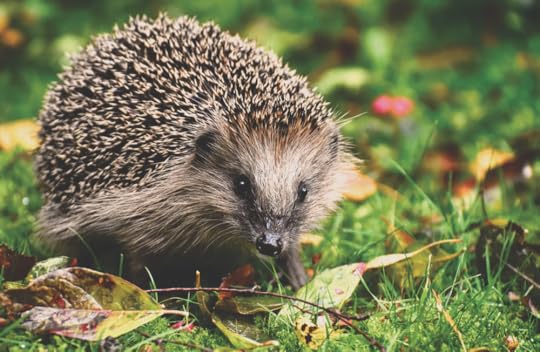Kathryn Nelson's Blog, page 3
June 20, 2021
Non-binary
TRIGGER WARNING: This fictional story contains body image and gender identity issues. It also contains acceptance and hugging.
I stand in front of the mirror, my skin damp from the shower, my short hair dripping. I frown at my reflection, at the body I detest. It’s not disgusting or deformed. In fact, it’s quite ordinary, perfectly normal. It just doesn’t feel like my body. It doesn’t feel right. I think: this isn’t what I’m supposed to be like, this isn’t supposed to be what houses my consciousness. Expect that it is. This is what I’ve been given for this lifetime.
I’m still a teenager, still rapidly changing. Yet the changes aren’t ones that I like. I lift my breasts, one in each hand. I think about the women who get boob jobs to make their breasts larger. I don’t really want them at all. They feel strange on my chest. They move in disconcerting ways. They’re not a part of me, yet I can’t get rid of them. The rest of my body is slim, athletic, proportionate. Neither the curves of a woman nor the musculature of a man.
I’m somewhere in between; non-binary.
As others in my age group are transforming into their adult forms, following the ancient archetypes of male and female, I am not. Perhaps certain parts of my body are changing along certain pre-laid plans, filling in specific patterns, but it’s against my will.
I rebel against this division in our society, in our roles, even in our public toilets. I am simply me, a unique being, with unique features and desires. I refuse to be categorised, to be neatly shoved into a box for the convenience of others.
I see the determination, the passion, in my eyes in the mirror. I drag my gaze away, break the obsession with my reflection, with my outward appearance. I am more than that, more than idealised, unobtainable, air-brushed body shapes, more than pre-prescribed clothes and colours, more than those narrow expectations.
I pull on underwear and jogging trousers. I put on a sports bra that holds my breasts flat against my chest. It’s uncomfortably tight around my ribs but it’s the best I can do. A baggy t-shirt over the top hides more of my skin.
I walk out of my bedroom, downstairs to the kitchen. My parents are preparing dinner, my younger sister is doing her homework at the dining table. Mum and Dad always cook together. They twirl around the kitchen as if in some well-choreographed dance. Dad chops onions. Mum spirals some oil into a frying pan and puts it on the stovetop. The chopping of the onions is completed just as the oil is hot enough. Dad slides the vegetables into the pan, placing a kiss on Mum’s cheek as she stirs the onions to a symphony of sizzling.
Dad notices me first, standing on the threshold. I don’t know what he sees in my face but he puts down the chopping board and knife, walks over to me and wraps his arms around me. A moment later, Mum hugs me too, her arms going around us both. I am enveloped in the warm comforting scent of home, of family. I feel another set of arms come around me too, as my little sister joins the group hug and we are complete. My heart swells with love.
“We love you,” says Mum, echoing my thoughts.
“We love you just the way you are,” Dad adds.
The tightness I often carry in my gut eases and I am filled with acceptance.
“The onions are burning,” says my little sister.
“I know,” says Mum. “This is more important.”
She kisses my cheek.
“Whatever you want to be, that’s fine with us,” says Dad.
“We want you to be happy,” says Mum.
“We’re your family,” says my sister. “Whatever you need, we’re here for you.”
Tears slide down my face as they hold me and the smell of burning onions fills the kitchen.

June 7, 2021
Coming out
The noise in the restaurant swirls around me but there seems to be a bubble of silence around our table. Mum and Dad sit opposite me, he perusing the menu, she sipping wine and watching the people passing in the street outside. I wish Laura was beside me, she’d know what to say, she’d tell some amusing anecdote or ask an insightful question. But we agreed that this was best done by myself. I was twenty-four, for goodness sake, you’d think I’d be able to have a conversation with my parents by myself. But I’m nervous about what I am going to tell them and they can sense my anxiety. I fiddle with my napkin, take a sip of water, straighten my necklace.
“What is it, Emma?” Mum asks, looking at me directly. “Whatever it is, tell us now and then we can relax and enjoy dinner.”
Dad looks up from the menu just as the waiter comes to take our order. Once we have done so and he’s left again, Mum reaches for my hand.
“What’s wrong?” she asks. Her grey hair falls softly around her face, her brown eyes kind, concerned. Dad places his hand over Mum’s, over mine.
I take back my hand, place them both in my lap, clenched around the napkin. They wait with patience. I can feel the words I want to say stuck in my throat. I’ve practiced them so many times, they should easily roll off my tongue but my mouth refuses to open, my voice trapped.
“Is it work?” Mum asks gently. I shake my head.
“Are your housemates still OK?” Dad asks. I nod.
“I’ve met someone.” The words croak reluctantly from between parched lips, my stomach twisted into knots.
“Oh.” Mum sits back in her chair, regards me closely.
“I thought you were going to say something bad,” Dad smiles at me.
The speech I’ve memorised is lodged in my throat, swelling as the seconds tick past, my ears roaring as my pulse thunders. The people sat at the table next to ours start singing happy birthday. A waitress brings out a cake adorned with lit candles. Other tables turn to look and the whole restaurant joins in. I let out my breath in a sigh and take a hasty sip of water.
“Well, what’s his name?” Mum says enthusiastically once the birthday candles have been extinguished and attention returned elsewhere.
“When can we meet him? What’s he like?” Dad asks, his expression a mix between fatherly protectiveness and, I think, relief that I’ve finally met someone that I like enough to mention to them.
I look down at the table, away from their expectant faces.
“Her name’s Laura,” I say quietly.
There’s a heartbeat of silence, as if the whole restaurant, the whole town has fallen silent at my announcement. It feels as if it stretches for eons but I’m sure it’s not so long. I dare to look up but my panicked brain is unable to decipher their expressions.
“Is that what you were so worried about telling us?” Mum asks.
I nod, unwanted tears gathering in my eyes.
“Oh, darling.”
She stands up and walks around to my side of the table. She crouches down, her pink flower-print skirt settling around her. She reaches out and enfolds me in a hug. For a moment, I am too startled to react and then my arms move around her back and I hide my face against her shoulder. Dad joins us and I scoot back my chair so he can wrap his arms around both me and Mum. I’m sure that other diners are staring at us, the three of us in a huddle on the floor, but I don’t register them. I breathe in my Mum’s familiar perfume, feeling safe and protected in my parent’s arms. My speech is forgotten; that mix of defiance and desire for acceptance, independence and understanding, not required.
Without any words, they tell me that I am loved, accepted.
Eventually, Mum stands up and follows Dad back around the table to their seats. She dabs at her eyes with her napkin. There’s a damp patch on her blouse where she dried my tears.
“So, when do we get to meet Laura, then?” Dad asks.
“Tomorrow? She suggested going for a walk along the seafront.”
“Good,” Dad nods.
“Does she make you happy?” Mum asks.
“More than anything.”
“Then you’re lucky to have found her, and she you.”
Mum reaches for Dad’s hand, their wedding rings catching the overhead lights.
“Thank you for telling us,” Mum says. “I’m so glad you’ve met someone who makes you happy.”
“We love you no matter what,” Dad says.
The fear which had been clenching my stomach tight eases and I take a deep breath. Mum reaches for one of my hands and Dad holds the other.
“You know I’m a romantic at heart,” Dad states. “The evening I met your mother-”
“Not this story again, Dad.”
“No, let me tell you…”
Mum watches his face with eyes full of love and I smile, his voice reminding me of bedtime stories when I was little. I hold their hands tight, so grateful for their acceptance, their love. Laura had been right and I was glad.
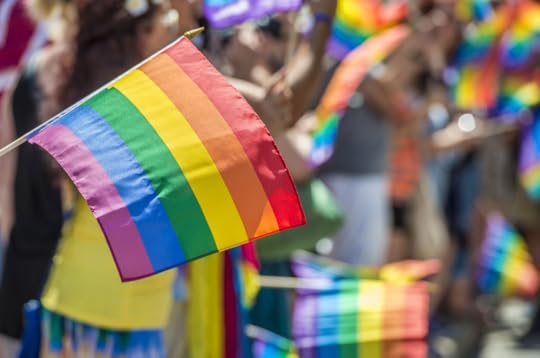
May 23, 2021
Campfire
We sit around the campfire. The spring sunshine is warm against my back but the northerly wind is chill as it swirls the smoke around and up into the blue sky. The community garden is just starting to awaken after winter’s slumber. Bright yellow daffodils bob their heavy heads. Seedlings push green shoots up out of the black soil. I even spotted some frog spawn in the pond.
I hold out my hands and look at the soil which coats my skin. I’d been helping pot up tiny bean seedlings in the polytunnel with one of the other volunteers. She hadn’t spoken much and neither had I but we’d worked together all the same, easing out the delicate plants from their overcrowded tray and tucking them gently into pots of their own, giving them the space to grow.
The charity that runs the garden offers a place for refugees and people from disadvantaged backgrounds somewhere to come twice a week, somewhere to learn new skills, somewhere to sit in the peace and quiet of nature. And there is a beautiful sense of peace here, even though we’re only just on the edge of the city.
We sit around the campfire. The man sitting next to me has a large black beard and is wearing a red and orange patterned hat. He opens his rucksack and pulls out a tub of food and a fork. As he removes the lid, the delicious scent of exotic spices reaches me. The thin woman with long brown hair sitting on my other side opens a packet of organic crackers and starts nibbling one.
I didn’t bring any food. I didn’t have any food to bring. I wrap my arms around my chest, draw my hoodie tighter in around me.
The woman who runs the garden lifts a huge kettle off the fire, steam wisping from its spout. The man who runs the garden with her, sets out an assortment of mugs. Together they organise who is having what to drink. There’s as large a choice of teas as there are mugs. I lower my eyes, shake my head when asked.
“You had peppermint last time, didn’t you? It’s leaves we dried here last summer. Would you like that again?” the woman cajoles kindly.
I nod. She remembered what tea I drank, even though it’s been weeks since I last came here. I wrap my hands around the hot mug, the ragged sleeves of my jumper protecting my muddy skin from the scalding heat. My mug as a drawing of cats lifting weights and the words, ‘I have strong felines for you’. My lips twitch at the terrible pun. The man next to me has a mug painted with pink flowers, filled with black coffee. The clean, fresh scent of mint rises from my tea. I take a sip and the heat flows down into my empty stomach.
Someone passes around a tub of homemade fruit cake. Nearly everyone else has taken a slice, so I decide that it’s alright for me to take one too. I raise the cake towards my mouth but realise that I should have washed my hands. I don’t want to stand up now and go to the tap whilst everyone else is eating. Then I notice that the person sitting across from me who is wearing leopard print leggings also has muddy hands.
I eat the cake, savouring every bite. I realise that I don’t mind the soil on my hands, it reminds me of the seedlings, of the plants which produced the ingredients for the cake and I feel a connection, I feel part of some larger pattern.
My stomach rumbles in gratitude for the most food it’s had in days. Someone passes around a bowl of apples and then a box of protein bars. I take one of each, put the apple in my pocket for later.
We sit around the campfire. I feel the cold wind and then the heat from the flames, alternating as the breeze swirls around the circle. A bird sings in the tree to my left. I let the chatter of the other’s swirl around me as the warmth of food and companionship fills me.
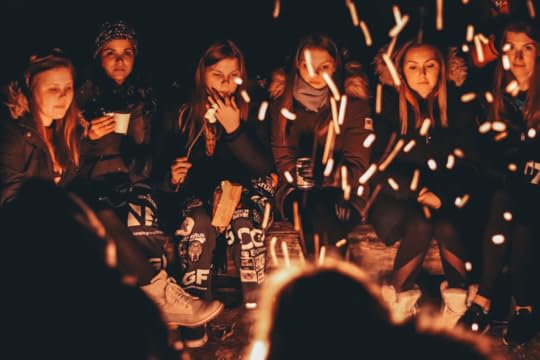
May 9, 2021
Allotment
April
I push the wheelbarrow down the hill, through the gate and along the path to my allotment, my allocated piece of land. The soil is dark brown, rich and damp, bare to the sun’s rays. The spring light is bright but a sharp northerly wind whisks away any heat. I crouch and place my hands, palms down, on top of the soil. For a brief moment, I close my eyes, release a breath. I feel the stresses of the week flow off my shoulders.
The elderly gentleman from a neighbouring plot greets me and I stand to converse about tomato seeds and courgette transplanting. After an hour of weeding, my back’s aching, so I sit on a tumble of old bricks and sip tea from my flask. I gaze out across the valley with the rows of houses and bisecting lines of roads. A buzzard soars over the opposite hill top, rising, circling, up into the blue sky.
My phone beeps, breaking the peace. I’m tempted to ignore it but I only manage to restrain my hand for a minute. I draw the device out of my pocket, scroll through the messages, the demands drawing me back out into the urban labyrinth, away from the green haven of my allotment. I shove the phone back in my pocket.
I use the side of my hand to drag a furrow in a clear patch of soil and haphazardly scatter in some seeds; a few beans, a couple of squash, a handful of beetroot. I don’t have time to be more careful. My time is up, I have to go, yet I need the food that my allotment provides, I need to get the seeds in the ground now.
June
I push the wheelbarrow down the hill, the big clouds overhead spilling cool shade and bright sunshine over me alternatively. When I reach my allotment, I crouch down and place my hands on the dark, bare soil underneath the tomato plants. I take a brief moment to close my eyes and draw in a deep breath. I feel a blaze of sun hot on my shoulders and the tense muscles unclench, ease out with my breath.
The pregnant lady from a neighbouring plot greets me and we talk about organic mulch and strawberry jam recipes. After an hour of weeding, my back’s aching so I sit and take a sip of lemonade from my flask. I look out over the valley at the cars crawling along the main road and watch a kestrel hover over the far corner of the allotments. For a brief moment, I allow a sense of peace to wash over me.
Then my phone beeps. I don’t even look at it, I know my time here is short. I pick a handful of tomatoes, a tub full of strawberries and a few mangetouts. That will do nicely for dinner and I’m grateful because there’s little else in the cupboard.
I wave to the man with dreadlocks as I push out through the gate then scramble to answer my phone before it stops ringing.
August
I push the wheelbarrow down the hill, the brim of my hat pulled low against the drizzle. There’s only one other person, bent over their allotment over the far side. When I reach my plot, I bend down to place my hands on the wet soil next to the flourishing courgette plant. I can already feel the water seeping through my old anorak into my sweatshirt. I hunch my shoulders against the chill breeze and yet that sacred touch of palms to soil still manages to ease some tightness in my chest, to lighten some uncomfortable weight which burdened me.
I work quickly, harvesting a mass of runner beans, a few courgettes, a tub of raspberries, some radishes, spring onions and rocket. I’m grateful for every item, no matter how odd the shape, how blemished, how muddy. I know that every single item of food will help to fill my stomach, to nourish me. I know that it’s my hands that have tended the soil, my effort that has planted the seeds, my determination that has kept the area free of weeds, my strength which has carried me here each week.
I take a brief moment to squint across the valley, the top of the opposite hill lost in the low cloud. I feel grateful for the soft rain which means I don’t have to lug the watering can repeatedly between tap and plot. However, I shiver as the water soaks all the way through my not waterproof coat. I push the wheelbarrow back up the hill, back home with my treasures.
October
I push the wheelbarrow down the hill, through the gate, into the allotments. High clouds veil the sky in pale grey, the waning sun haloed in rainbow light. When I place my hands against the soil, brown leaves crunch against my skin. I draw in a deep breath of the crisp autumn air.
The lady with pink gloves and an expensive hair-do greets me and we discuss winter crops and local politics. I pull out the dead tomato plants and take them to the compost heap. I dig up the last of the potatoes, a few beetroots and carrots. When my back starts to ache, I sit on a pile of bricks and sip tea from my flask. I gaze out across the valley, thinking about the turning of the seasons, of the unrelenting wheel of change. I think back to the start of the year, of placing those tiny seeds in the ground and how they’ve grown and borne fruit and then faded back into the ground.
There’s a melancholy to autumn which balances the optimism of spring. Everything has its time, its place and I find comfort in the thought that I am exactly where I should be. I accept where I am, although I do not necessarily like it or want to stay here. I know that all things change. I am where I am meant to be for now. That too will change and I am glad.
My phone beeps. I gather my harvest and walk back up the hill, pushing the wheelbarrow.
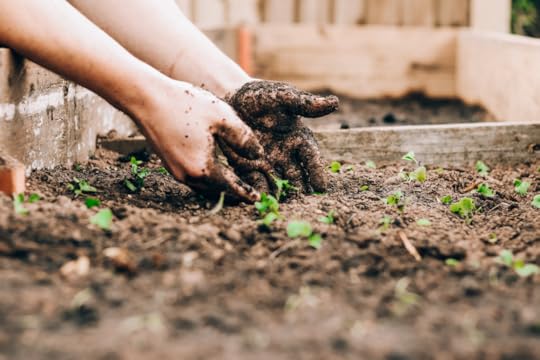
April 25, 2021
Kelp Holdfast
I tug on my wetsuit. There are a few people left on the beach but the main crowds have gone home. The sun is settling towards the western horizon but there will still be an hour or more of daylight left, plenty for an after-work swim.
I pick up my fins and my mask and snorkel. Down at the water’s edge, the sea laps calmly at the shingle. I look out across the blue-green surface, hiding the secret world below.
No matter how many times I’ve done this, I always feel that tingle of excitement. Every time is different, every time a new wonder is revealed.
I wade in up past my knees. Even though it’s summer, the sea is still chilly as it seeps through the wetsuit and swirls around my toes. I pull on my fins, slide the mask over my eyes and put the end of the snorkel in my mouth. I launch into the water, immediately submersed in the subaquatic world. Immediately, the concerns of my land-based world are washed away. I leave behind my worries about work, about remembering to pay the electricity bill, about doing the pile of washing up I left on the kitchen counter. Here, none of that matters.
My splash startled a plaice, just a handspan long, a juvenile. The diamond shaped flatfish settles back into the gravel of the seabed, its mottled fawn, russets, ambers and chestnuts camouflaging it perfectly.
I swim on, out into deeper water. As I glide above the seabed, I spot a whelk, a big sea snail, crawling over a boulder. A lesser spotted catshark, also known as a dogfish, lies in the shelter of the boulder. Its slender, shark-shaped body is a mottled grey and brown, an arm’s length from snout to tail. It watches me warily as I hover overhead. I notice a cluster of egg cases attached to strands of seaweed and nestled into crevices in the rock. Sometimes called mermaid’s purses, the egg cases of the shark are a golden brown, a finger’s length long, a tapered rectangular capsule with curly strands at either end. Inside each one is a baby shark. After nine months, the shark hatches and the case is washed up on the beach.
I swim on and the seabed changes as the gravel becomes interspersed with cobbles and boulders and then patches of bedrock, thrusting up in irregular reefs. It was here, a few years ago, that I found a tiny piece of kelp. Now, there’s a whole forest of it. Well, a whole patch of forest, at the very least.
The entire reef and any place where there is a sufficiently firm surface for the holdfast to grip, there are towering kelp. The tangled roots of their holdfasts taper to a slender stalk which flares out to a flattened blade, a handspan wide with crinkled edges. The coffee coloured fronds – expresso to latte – sway up through the water to where I float on the surface, four or five metres above the reef. There’s another type of kelp as well, which has multiple, smaller blades rising off a broad base above the stalk, like a many fingered hand.
I draw in a breath and dive down, swim along the edge of the kelp as if I’m soaring through a forest. The fronds sway with the current, forming mesmerising patterns of light and shade, blue and green, ochre and chocolate.
I spot a cuttlefish hovering at the edge of the forest, a submarine alien. Eight arms and two tentacles front its head, topped with large golden eyes with a ‘W’ shaped pupil. Its body is ovoid with a frilly skirt, patterned with a mesmerising assortment of designs. Its mottled brown and yellow spots change to black stripes, to white lines to grey bars. I kick back up to the surface and the cuttlefish shoots off with a jet of water from its siphon.
I drift for a time, absorbed by the wonderous diversity of this mystical underwater world. A shoal of small silver herring dart past, followed by a group of striped bib pouting, flashing silver and black. A navy blue lobster creeps out of its cave, only to duck back in as a large brown crab with black-tipped claws struts past.
I attempt to smile around the snorkel’s mouth piece. This isn’t some long-haul flight distant, exotic resort. This is just a few minutes from my house on the south coast of England. This is the murky, chilly English Channel.
This is my local area, my little piece of nature, my escape right on my doorstep.
I’ve watched this whole area flourish over the past few years. This is an underwater nature reserve where damaging activities are restricted and habitats carefully managed, monitored. This is worth protecting.
I turn back towards the beach, my heart buoyed with joy and I hold fast to the hope that this area will continue to be protected, to be enjoyed and to be a wealth of abundance.
This story follows on from the story I wrote a month ago [Sussex Kelp] in response to new legislation which prohibited trawling close inshore along the Sussex coast. The hope is that with the restriction of damaging fishing activity, the kelp which once flourished there will be able to return. The previous story extolled the joy at finding a new, tiny kelp plant. This story is set several years later, once the kelp has become more established and some of the creatures that live in kelp forests have returned.
This story is about holding fast to a vision of a healthier, more diverse, more abundant future. As well as celebrating the nature which is right on our doorstep, nature that we can interact with, support and enjoy.
Links to further information:
https://www.sharktrust.org/FAQs/smallspotted-catshark-id-guide
https://sussexwildlifetrust.org.uk/helpourkelp
https://www.sussex-ifca.gov.uk/kelp
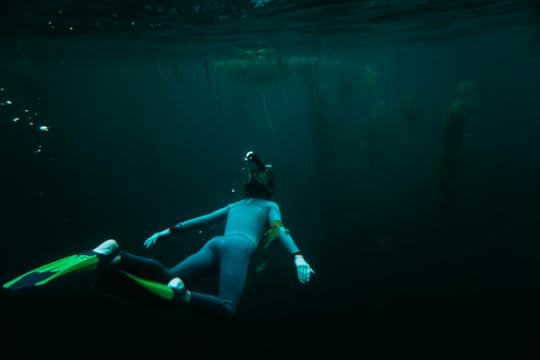
April 12, 2021
Beavers slow the flow
At first, I thought it was a log, or perhaps a dog, gliding across the pond in the low evening light. It was over a metre long, chunky and a few shades darker than the muddy brown water. Only its head was above the surface, although I could see its body and huge flap of a tail, just under the water. It had rounded ears, black button eyes and a broad nose. I stood utterly still under the rustling willow tree, not even daring to raise my binoculars in case I startled the creature. I knew they didn’t have very good eyesight, but their noses were sensitive and their hearing was pretty acute.
The early summer evening was cooling rapidly and shafts of golden light speared through the trees. The bright leaves of the willow, birch, rowan and aspen shimmered in the lilting breeze. Dragonflies zipped over the surface of the pond and tiny glittering insects bobbed in the clear air. I could hear blackbirds, long tailed tits and warblers chirping in the trees. A woodpecker briefly hammered.
I’d been walking along the footpath, paralleling the stream uphill from the village of Ford. We’d had some bad floods there a few years ago but it had been better recently. Here, the ground levelled out and the stream’s flow was slower. This was also due to the tumbled pile of logs strewn from bank to bank. Mud and sticks were caught between the logs, forming a dam, creating a pool of water upstream. Water still flowed through some parts of the dam, a trickle spilled over the top and rivulets had spread out around the sides.
I walked on further, skirting the edge of the pond. I was glad that I was wearing my welly boots, as the ground was marshy, squelching underfoot. Small channels and tributaries fanned out around the pond, creeping into the reeds and tall grasses. I saw a clump of frogspawn at the same time as I heard a frog croak and another’s answering call.
I stopped beside a stand of young willow. Some of the stems had been sheared near their base and masses of new growth had shot up in response. My attention was drawn back to the pond as I heard a splash. The ripples had almost faded when the fish leapt again, chasing flies. By now, thick shadows were gathering under the trees and the water reflected the pinks and peaches of the fading sunset.
I drew in a deep breath, drawing in the peace and calm of the woodland. I felt the stresses of work lift a little as I let my mind rest in the natural beauty.
The grass on the other side of the pond wavered and the beaver waddled into view. It was dragging a sheaf of reeds. It paused at the water’s edge and picked up one of the stalks to nibble. Even in the dim light, I could see that its huge front teeth were a strange shade of orange, fortified with iron to strengthen the ever-growing chompers. Three kits scampered out of the reeds, one barrelling past its siblings to be the first to splash into the water.
The adult beaver gathered up the bundle of reeds and carried them into the water. It swam over to the dam, gliding smoothly through the water with the kits frolicking and splashing behind. The beaver tucked the reeds under a stick on the front edge of the dam, before diving down into its hidden lodge. Two of the kits followed their parent underwater but the third picked up one of the reed stalks, clamping it in its mouth before also diving down, leaving only a faint ripple.
I too, decided it was time to return home for dinner. I took one last, lingering look across the watery clearing and felt a wave of gratitude for this simple moment, surrounded by nature, witness to such amazing creatures as wild beavers, returned to the countryside after an absence of hundreds of years.
Links to further information:
https://www.nationaltrust.org.uk/press-release/national-trust-announces-first-beaver-reintroductions
https://www.bbc.com/news/uk-england-cumbria-54972840
https://youtu.be/IAM94B73bzE Beavers and Wildfire: a stop-motion story by Emily Fairfax
https://www.devonwildlifetrust.org/what-we-do/our-projects/river-otter-beaver-trial
https://www.northwaleswildlifetrust.org.uk/welshbeaverproject
https://sussexwildlifetrust.org.uk/beaver

March 29, 2021
Changing the clocks
I walk into the town hall. The lights are bright, shining out into the cool darkness of the spring evening. There are only a few people inside, the main rush having passed. I came as soon as I could after work but can’t help feeling that I’m late.
There are tables laid out down the length of the main hall. Some volunteers are starting to pack one of the rows away, the folding legs snapping closed with echoing bangs. Through the open hatch in the far wall, I can see other volunteers washing up and putting away plates and cups. There can be a real festival atmosphere here sometimes. Again, I feel that I am late to the party.
There are still some items left, though and I know that however late I am, I won’t go home empty handed. One of my neighbours passes me on her way out and we murmur polite small talk for a moment.
I walk towards the last table that is not empty, my heart fluttering with a mixture of excitement and anticipation. I’ve lost count of how many times I’ve done this before, yet each occasion feels like a special event.
There are three clocks on the table top.
One is round and white. It’s a simple design with a plain face and black hands and numbers. On the back is a hook to hang it on the wall. The cover for the battery is held on with tape.
The next clock is a black box with red digital numbers on the front. There’s a sticker of a cartoon bear on the side.
The last clock is half an arm’s length tall with square sides, tiny brass feet and a lovely bell-shape curved front face. The hands are ornate curlicues with arrowhead points. The hours around the clock face are depicted by tiny, detailed illustrations of woodland creatures. There’s a solitary fox for the one, a pair of red squirrels for two, all the way round to a flock of twelve starlings. On the back is a handle for winding up the clock each day.
I pick it up, honoured to be its custodian for the next six months.
This is the changing of the clocks. It’s one of those old customs, peculiar to our village. On the last Sunday in March and again in October, we change our clocks. Every household in the village brings a clock to the town hall. This morning before work, I dropped off the clock I had been looking after. Now, I pick up the clock that I will hold for the summer. As every household donated a clock, there is always another one for each household to pick up. Occasionally, someone gets the same clock back but I’ve had a different one each time.
I look down at the clock in my hands, knowing that I will only hold it for a short while. That is the point of this custom; a reminder that each of us holds time for others in our community.
This clock was generations old. Others had held it before me, lightly, fleetingly. Now I held it for those who would come after me.
Some people hurry through life, worrying constantly about time, about how much they have, whether they are wasting it, whether they are going to be late. Here was a reminder of something greater than that selfish, high pressure rush to use a finite resource. Here, I touched a piece of our community and I felt connected to an abundant, renewable wellspring of infinite possibility.
Back at home, I sit and watch the hands tick around the clock face, knowing that each second is precious.
The character in this story has come to possess a clock but they know that they are only borrowing it; others have held it before them and others will own it after they have passed it on. It’s an interesting frame for considering our time on this planet. In geological, universal terms, we’re only here for a brief time, our possessions, our actions, our lives, fleeting, yet each second precious.
Links to further information:
https://longnow.org/ The Long Now Foundation fosters long-term thinking and responsibility in the framework of the next 10,000 years.
https://www.bbc.co.uk/newsround/37645854 BBC article about why the clocks change from GMT to BST in the UK. Well, not really changing the clocks, just the time....
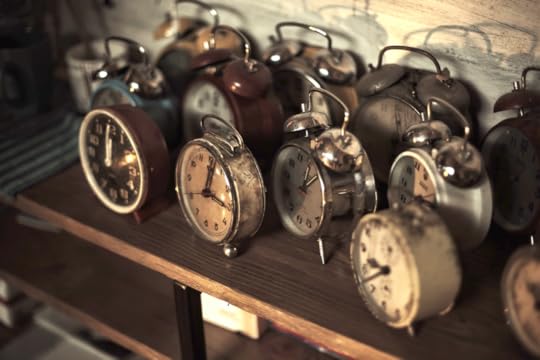
March 22, 2021
Sussex kelp
A fictional story written in response to new legislation which prohibits trawling close inshore along a section of the coast in southern England.
I pull on my wetsuit, always a slightly awkward manoeuvre, no matter how many times I’ve done this. The sun is shining its warmth down on me but I know that the sea will be cold. There are a few other people on the beach; a lady walking her dog, a group of teenagers playing volleyball, a family sat on a picnic blanket, but a lot of people have already gone home for the evening.
I walk over the shingle, down to the water’s edge. The calm green-blue sea laps lazily at the shore. I wade out a few steps before tugging on my fins over my bare feet and pulling my mask and snorkel over my face. I can’t wait to see what's underwater, so I dive forwards, mindful of the shallow depth. I smile around the snorkel in my mouth, my breath rasping through the tube.
It is a different world down here, a secret place that you don’t know about, can’t see, until you’re here, immersed in it. I kick my legs, my fins amplifying the movement as I glide through the water. I'm only a stone’s throw off the beach and already I am transported into a realm which made me feel like an intrepid explorer.
The water is murky. This is the south coast of England, after all, not some destination from a tropical holiday brochure. It’s to do with the nature of the sediments here, the mud of the harbours and the sand along the coast and the storms and the nutrients which feed all the tiny plankton. It’s those microscopic creatures which form the base of the oceanic food chain, right up to the biggest whales. Even here, in the English Channel, the history books reveal the pilot whales, angel sharks, the huge tuna, the enormous plaice which used to inhabit these waters.
A few hundred metres out from the beach and the shingle is interrupted by boulders, cobbles and up-thrusting ragged lines of the underlying rock. These hard structures have been colonised by a mosaic of algae, bright reds and greens, as well as strange, immobile creatures.
I draw in a breath and dive down.
I see a cluster of tiny orange disks with creamy stars in the middle; colonial ascidians. In a crevice, I spot a blue mussel, the two halves of its shell agape as it feeds. I float back up towards the surface, my lungs straining for air, a shoal of black and white striped pouting darting around me.
I pop up to the surface to grab another breath and dive back down. The longer I look at the reef, the more creatures I see; such complex diversity, so many fragile communities.
It’s on my fourth dive that I see the kelp plant. It is no longer than a handspan, its tapered blade waving in the gentle current. It is a rich chestnut brown in the waning evening light. It clings to the reef with a holdfast; a tangled twist of roots.
Historically – actually not too long ago – this whole area was covered in kelp. A kelp forest, they called it, as the dense fronds grew like slender trees, creating habitat for hundreds of species. The forest disappeared a few decades ago due to a combination of factors. Storm damage, climate change, poor water quality and trawling were all implicated. Now, though, changes in the local fishing laws have given the kelp a chance at recovery.
This is the first frond of kelp that I’ve found and my heart lifts with joy to see it.
I float on the surface, head down, looking into an alien world. The little piece of kelp fills me with hope. Hope that this whole area can undergo a sort of underwater rewilding, that with the regrowth of the kelp, will come a return of the species previously confined to the history books. Kelp can grow several centimetres a day and produce millions of offspring. If storms damage its blade, it can regrow from its holdfast.
As I turn back towards the beach, I hold fast to the image of that new kelp plant, growing in the place of its ancestors, growing into a new, wilder future.
Sussex Inshore Fisheries and Conservation Authority (IFCA) have recently announced new legislation which restricts trawling activity close inshore along the Sussex coast, protecting diverse habitats and supporting low impact fishers.
Here’s the press release: https://secure.toolkitfiles.co.uk/clients/34087/sitedata/files/Byelaw_docs/Nearshore-Trawling-media-release-2021-1-.pdf
Further information from Sussex Wildlife Trust: https://sussexwildlifetrust.org.uk/helpourkelp

March 14, 2021
Kite perspective
I soar on broad wings over the forest. Far below, the tops of the trees move to the same wind which ruffles my feathers and lifts me high into the vast sky. My wings are patterned black and white, the rest of my feathers are a burnished bronze and burning mahogany in the sunlight.
I open my sharp beak and release a piercing cry, a celebration of freedom, of joy, of life.
The cold air rushes past me, clean and crisp. I adjust my forked tail minutely, tilt a little to the right and drift over towards the lake.
My keen eyes identify the pair of storks standing at the water’s edge. Like me, they are recent additions to this land, although they tilt their heads to survey their surroundings as if they have always been entitled to exist here. Perhaps they have.
Like me, they were hunted, driven out and now have returned.
I too soar through the sky as if I have every right to be here. The wide expanse of blue surrounds me, bright and pure, only a few grey clouds hover over the coast some distance away.
As I circle, I spot five other birds like me, gliding through the sky, circling far above the ground. Once, there were so few of us that I could fly for days alone. Now, we flock as if we are not noble, solitary, avian predators.
Now, we are abundant and I am filled with joy to see my brethren soar beside me.
I flap my strong wings, gain more height until the lake becomes a shimmering puddle. For a heartbeat, I hang on the highest thermal, weightless, unbound. The earth is laid out far below, any concerns about mate and nest, prey and performance are far distant insignificances.
I draw my wings back and my perspective shifts. I swoop down, the cold air rushing past me, ruffling my feathers. I squeeze my eyes closed to mere slits, solely focussed upon my goal. There is only this moment, this breathless, joyous freefall.
For a heartbeat, this all I know, then I snap out my wings to their fullest extent, feel the air pressure pushing against my skin, my bones. I brush the treetops and soar up again, a fierce cry escaping my throat, a cry of joy, of freedom.
The story of the recovery of the red kite in Britain is an incredible story of dedication and sustained hard work. In the early 1930’s, there were only two breeding pairs in the British Isles, as they had been hunted to near extinction because, although they are mainly scavengers, they do also prey on domestic and game fowl like chickens and pheasants. Protection of key sites in Wales, as well as reintroductions in Scotland and England have increased numbers to more than 10,000 across Britain, with almost 2,000 breeding pairs.
Like the red kite in this story, sometimes we need to zoom out a bit and take a look at the bigger picture. Then we can refocus on what’s important and swoop down towards it.
Links to further information:
https://community.rspb.org.uk/wildlife/f/all-creatures/8984/21-facts-about-red-kites Facts about the red kite.
https://birdsofbritain.co.uk/features/red-kite2.asp Further information about the red kites in Wales.
https://www.british-birdsongs.uk/red-kite/?type759 Here you can listen to the red kite's call.

March 7, 2021
Insomniacs and hedgehogs
I zip up my coat and open the back door. I close the door quietly behind me so as not to wake the rest of the household. The full moon shines brightly out of the clear sky, washing the garden with silver light. There’s a wonderful hush over everything. Even the occasional car driving along the main road at the bottom of the hill seems muted. With the brilliance of the moon and the orange glow of the streetlamps, only a handful of the brightest stars are visible. I know that there are many more that I cannot see, scattered across the vast sky.
I sit down on the doorstep, lean my head back and close my eyes. I have no concern that I’ll fall asleep out here. If only I could sleep then I wouldn’t be out here observing these secret hours of early morning that few witness, only the insomniacs, the night workers, a few midweek partiers.
A snuffling noise breaks the peace of the moment and I force my eyes open. I am briefly gripped by an ancient panic of being alone in the dark with unseen creatures but my limbs are too heavy for me to push to my feet. It sounds as if a herd of boar are rummaging through the bushes. I hold my breath.
A creature no longer than my forearm trots out of the hedge on short legs and crosses the moon-washed lawn. Its pointed snout snuffles through the grass. The pale tips of the spines which cover its body wave boldly with its movement.
The hedgehog pauses, lifts its nose and looks directly at me.
This creature of the night recognises another nocturnal being. We watch each other for a long moment, the small black eyes and twitching whiskers regarding me with curiosity.
The screaming bark of a fox shatters the moment and the hedgehog trots off, moving remarkably fast for so small a creature.
Lying awake in bed at 3am the following morning, I think about the hedgehog, about what I learned browsing the internet during my lunchbreak. I slip out from under the duvet, careful not to disturb the bed’s other occupant. I step out of the back door, carrying the cat’s bowl. We have one of those fussy cats which often does not eat all of their food. I place the bowl down at the edge of the lawn and sit on the doorstep. Although I wait until dawn’s light floods the sky with rosy peaches, I do not see the hedgehog.
Lying awake at 4am the following morning, I think about the conversation I had with my neighbours, about the holes I’ve cut in the bottom of our fences. I think about the messy corner of the garden that I’ve always felt guilty about being too tired to tidy up, with its overgrown grass and pile of rotting wood, exactly the sort of place that hedgehogs like.
It’s past bedtime the following evening when I sit down on the back doorstep next to my eldest. The youngest is in bed but the eldest insisted on staying up until dark for the chance to see the hedgehog that I haven’t been able to stop talking about for the past few days.
There’s a saucer of fresh cat food on the edge of the lawn. The night sky is overcast, the clouds creating a strange orange reflection of the streetlamps. We sit in comfortable silence, listening to the traffic on the main road, the barking of a dog, the scream of a fox, the soft hoot of an owl.
Then we hear a rustling and we hold our breath in anticipation.
The hedgehog steps boldly out of the bushes, on to the lawn, nose twitching. It’s wary of the cat’s food, approaching hesitantly, sidling closer then turning away. We sit patiently, watching the hedgehog roam around the lawn.
On the far side, the first is joined by another. The hedgehogs sniff each other, spines bristling. For a long moment, they are stationary, eyeing each other. Then they turn and trot across the lawn to the cat food. They lower their heads in unison and start to eat. My eldest grins, delighted that our offering has been accepted. The first hedgehog looks up at us, regarding us with gratitude, or so I like to imagine.
As soon as they finish eating, the hedgehogs walk off and disappear through the gap in the fence. We stand up and go into the house to sleep.
Appropriately enough, I wrote this story at 3am when I couldn’t sleep, with the light of the full moon shining across my desk, with that wonderful early-hours-of-the-morning hush blanketing the mundane, distracting, daylight thoughts and tasks.
Hedgehog numbers are in decline in the UK. You can help by leaving overgrown areas in your garden, as well as log and leaf piles, or you can build them a hedgehog house for hibernation and for raising their hoglets. You could consider providing fresh water and wet cat food or specialist hedgehog food. They eat slugs and snails so can be useful to gardeners, just don’t use pesticides. You can also cut holes in your fence to help hedgehogs roam freely.
Links to further information
https://www.rspb.org.uk/birds-and-wildlife/wildlife-guides/other-garden-wildlife/mammals/hedgehog/ RSPB info on hedgehogs.
https://www.woodlandtrust.org.uk/trees-woods-and-wildlife/animals/mammals/hedgehog/ The Woodland Trust info on hedgehogs.
https://www.wildlifetrusts.org/wildlife-explorer/mammals/european-hedgehog The Wildlife Trusts info on hedgehogs.
https://www.britishhedgehogs.org.uk/ The British Hedgehog Preservation Society.
